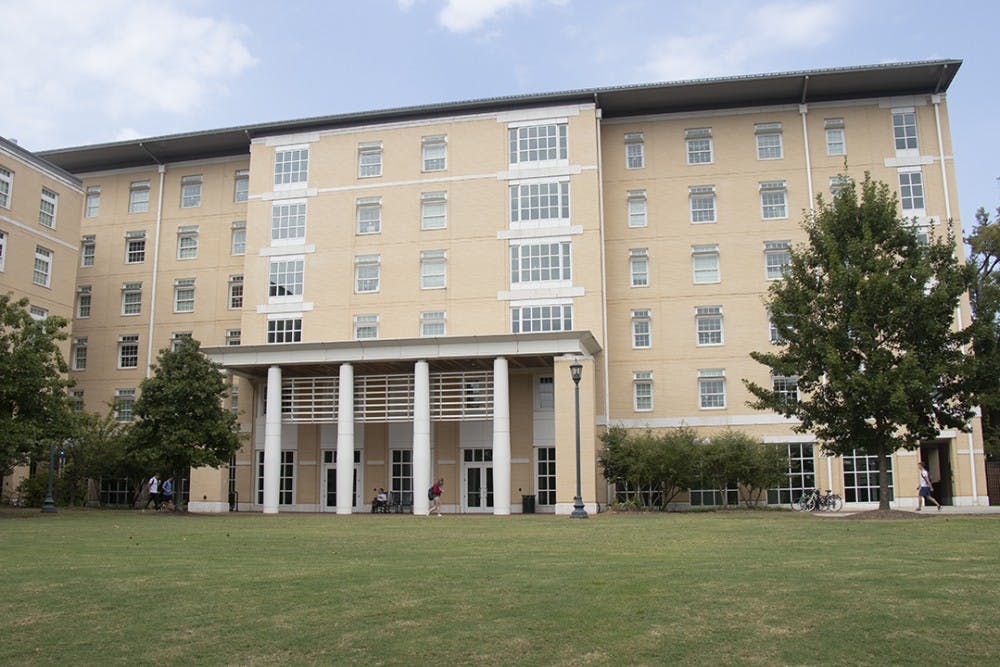The board of trustees building and grounds committee proposed a $19.5 million renovation project in the Honors Residence Hall that would construct the third wing of the hall from the building's original designs as a separate building.
The proposed renovations include 144 student beds, five new classrooms and common areas with an activity space, a kitchen space, a central laundry and study or community spaces. Derek Gruner, the university architect, said in an email interview the proposed expansion largely sticks to the original architectural design of the current Honors Residence Hall.
“The expansion will blend seamlessly with the appearance of the existing building and be five stories in height matching the other wings,” Gruner said.
Steven Lynn, the University of South Carolina’s Honors College dean, said in an email interview this is the right step for the Honors College.
“Our current freshman class is larger than the building capacity, and this expansion will allow future Honors College freshmen the opportunity to live with their classmates in the Honors Residence Hall,” Lynn said.
Matthew Seraydarian, a third-year biochemistry and molecular biology student, said this proposed expansion would accommodate for the increased enrollment in the Honors College.
“Expanding the Honors College to allow more high achieving students out of high school to be able to be a part of this prestigious Honors College would be a good thing for the university,” Seraydarian said.
Lauren Kastein, a third-year psychology student, said these proposed renovations would not be beneficial to the whole student body, especially in light of instances of illnesses caused by mold in residence halls.
“It’s targeting just the Honors College students, and there’s plenty of dorms that have much worse problems than just a bigger building,” Kastein said.
Lynn said the proposed renovations would help house the doubling student population in the Honors College since its opening ten years ago.
“The Honors College is thriving and growing, and as a result, we’re now fortunate to have this new wing being built to complete the original building design from over a decade ago,” Lynn said.
Xzavian Slaughter, a first-year computer science student and current resident at the Honors Residence Hall, said these renovations could create new opportunities for students.
“Last time I checked in on the current residency rate, we hit 100% occupancy this year," Slaughter said. "So if they were to add that third wing there would be a lot of new rooms open and a lot more people that are available to come in to Honors College."
Naomi Kemp, a third-year biology student currently in the Honors College and a resident mentor at Women’s Quad, said other residence halls have a greater need for renovations.
“It’s hard to kind of justify adding and investing more time and money into the residence hall at honors, just because it’s at the same stage as, like, Women’s Quad or Patterson, for example, but even better because it has its own dining hall, it has nice classrooms and things already,” Kemp said.
This project also raised questions about some of the possible unintended consequences of this construction.
Christina Schweitzer, a first-year nursing student, said there would be a loss of green space in the Honors Residence Hall courtyard as a result of the proposed renovations.
“It wouldn’t give [students] as much space to sit outside or do homework. So they could that into account and give them other spaces to go study outside and get fresh air,” Schweitzer said.
Gruner said it is a challenge to incorporate a new building into the Honors Residence Hall site, in addition to those already posed by the constrained nature delivery, storage and the actual work on site. The new building will not be connected to the current residence hall in order to maintain fire access on Sumter Street.
“Challenges include constructing a complex project in a constrained site where student safety and access to the existing Honors residences and movement along Sumter Street must be the primary consideration,” Gruner said.
Kemp said the equity in the standard of living for all incoming freshman should be upheld before expanding honors or other newer residence halls.
“It would benefit more students to put that time and energy and money into other residence halls that would be affecting the standard of living for many incoming freshman versus just making honors that much better,” Kemp said.
Seraydarian addressed the reasoning behind the importance of these proposed renovations to the Honors Residence Hall on the university as a whole.
“I know that there are definitely older buildings that could use more renovations, but at the end of the day, I understand why universities make money, why universities do what they need to do,” Seraydarian said.
Kemp said the Capstone program also benefits students, but does not receive the same attention as the honors program.
“Some people find that being in Capstone is even more beneficial than being in honors, and yet their residence hall is not up to par with the Honors College, even though it has so much opportunity and so many students that are excelling in that program,“ Kemp said.
Gruner commented on this project’s potential implementation in regards to future maintenance and renovations in other residence halls around campus.
"Renovations have been occurring annually and are planned to continue in the future regardless of the Honor's College Residence Hall Expansion project,” Gruner said.
If approved, construction for these renovations would start in 2020 and potentially be completed before the 2021 fall semester.

